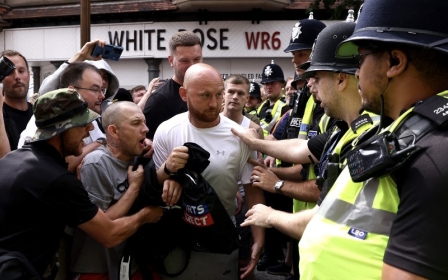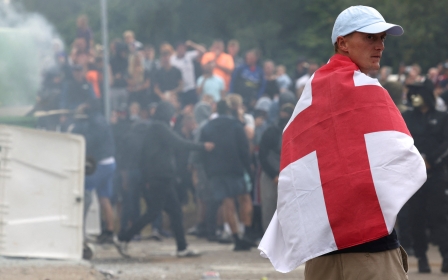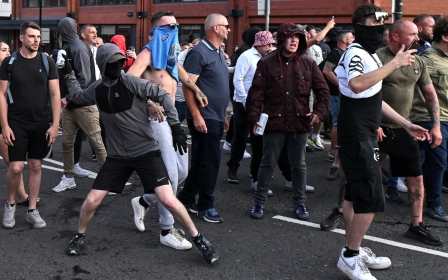UK riots: Social media users slam mainstream media for 'legitimising' far-right violence
Thousands of people have taken to social media to criticise mainstream media outlets for using language they say downplays the nature of the ongoing far-right riots in the UK, where mobs have targetted immigrants and Muslims.
Violence began last week after a stabbing attack that killed three girls and injured eight others in Southport was falsely attributed to a Muslim "illegal immigrant".
Far-right rioters across the country mobilised to attack Muslim-owned businesses and mosques, as well as buildings believed to be housing refugees. The rampages were organised online and fuelled by disinformation spread through social media platforms.
In viral social media posts, many users highlighted the media's role in the attacks, criticising the use of terms like "demonstrators" or "protesters" to describe the rioters, arguing that such language serves to legitimise the mobs.
In one clip, a BBC reporter refers to the riots as a "pro-British march".
New MEE newsletter: Jerusalem Dispatch
Sign up to get the latest insights and analysis on Israel-Palestine, alongside Turkey Unpacked and other MEE newsletters
"Calling a race riot a 'pro-British march' so casually, so unthinkingly, is incredibly telling," said one user on X, formerly known as Twitter.
"This isn’t impartiality, you are putting brown and Black lives at risk from fucking fascists."
So disappointing from @BBCNews, racist rampages are not pro British, standing against them is not anti british. I beg you to get your shit together before you continue to fan the flames and put more people in danger. https://t.co/xLeO8H4CTU
— Louisa Wells (@Louisa_Wells) August 4, 2024
"Is there any awareness at the BBC as to how dangerous this reporting is?" asked another.
“This isn’t pro-British, this is a racially motivated, violent attack by thugs, just waiting for an excuse to commit anarchy,” another responded.
A BBC spokesperson told MEE that the reporter "was referring to the fact the march was advertised as a 'Pro-British March' and this was made clear at the start of the report".
"We acknowledge in this one instance slightly later in the report it should have been more clearly attributed, and we would advise anyone seeing this, and other clips of BBC reporting to look at the original report in full instead of partial clips which miss key context," the spokesperson continued, adding the broadcaster took "great consideration to the language" used to cover the riots.
"We have been very clear about events being racially motivated where we have seen the evidence for this, and will continue to do so."
i don't know how you can watch this and not see racist violence in the UK as top-down. even *morning TV* has been aggro for so long. 100% conflict-driven, guests can't get through 3 words, presenters cry "i'm being attacked!" & people wonder why society is now a massive tinderbox https://t.co/SYlRMEhICA
— 𝖊𝖌𝖌 (@emmaggarland) August 5, 2024
"Media, including BBC News, is part of the problem; they have all given legitimacy to these far-right race riots by calling them 'protests' and 'demonstrations'," said another user on X, alongside a screengrab of a video posted by the BBC titled "Cars and shop torched in violent UK protests".
"Non-white people are being attacked. That's not a 'protest'. Language matters."
Some users have accused mainstream media and political figures in the country of glossing over the xenophobic nature of the attacks, while others have criticised headlines they said placed blame on minority communities.
“This is an absolutely disgraceful headline. Muslims were forced to defend their mosques, businesses and homes because our communities have been terrorised by racist thugs," wrote one user in response to a Daily Telegraph headline that said the far-right "clashed" with Muslims.
"Those thugs have been emboldened by racist journalists who absolutely despise British Muslims."
#BBCBreakfast describes the far right pogroms as "anti immigration protesters". In Bolton are are told about Muslims "chanting Allahu Akbar towards the pro British protesters"
— Saul Staniforth (@SaulStaniforth) August 5, 2024
Everyone involved in this program should be thoroughly ashamed. pic.twitter.com/jjzP7Rxbzy
Several people shared posts stating that many mainstream media outlets and politicians have for years “normalised” Islamophobia and racism or spread misleading information about migrants, arguing that this laid the foundations for today's attacks.
In a statement late on Saturday, the Muslim Council of Britain (MCB) said hundreds of mosques were toughening their security after far-right mobs "terrorised Muslim communities", triggering "anxiety and fear".
"What we saw on the streets of Britain [is] the consequence of unchecked Islamophobia: acceptable, potent, and very real in our society today," Zara Mohammed, the secretary general of the MCB, said in a statement.
"The government is right to speak out against the extremism witnessed on our streets, but it has been silent on the Islamophobia fuelling that extremism."
Middle East Eye delivers independent and unrivalled coverage and analysis of the Middle East, North Africa and beyond. To learn more about republishing this content and the associated fees, please fill out this form. More about MEE can be found here.




